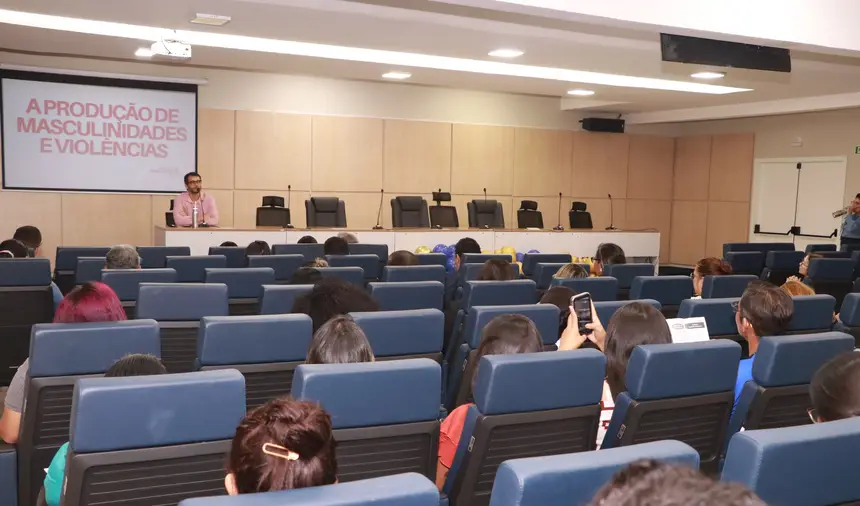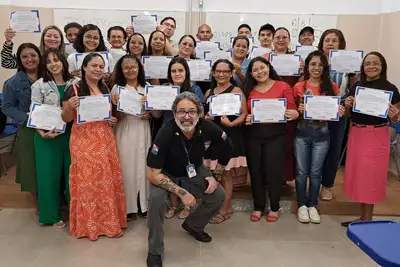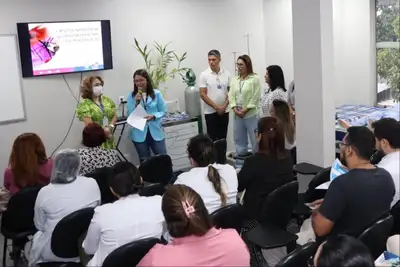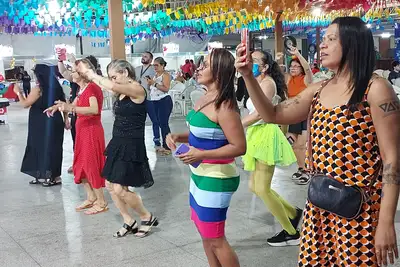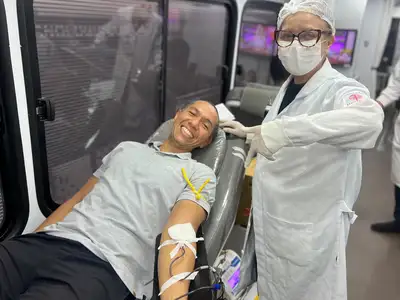'Blue November' intensifies guidance for men's health care
At the beginning of the campaign, there was a seminar at Sespa to discuss themes associated with confronting gender-based violence
With the theme "Masculinity and violence: where it comes from and how to change it," the "Blue November" campaign of 2025, held in Pará by the State Department of Public Health (Sespa), emphasizes the fight against gender-based violence and reinforces the encouragement for men to seek assistance at Basic Health Units, which are the entry points to the Unified Health System (SUS).
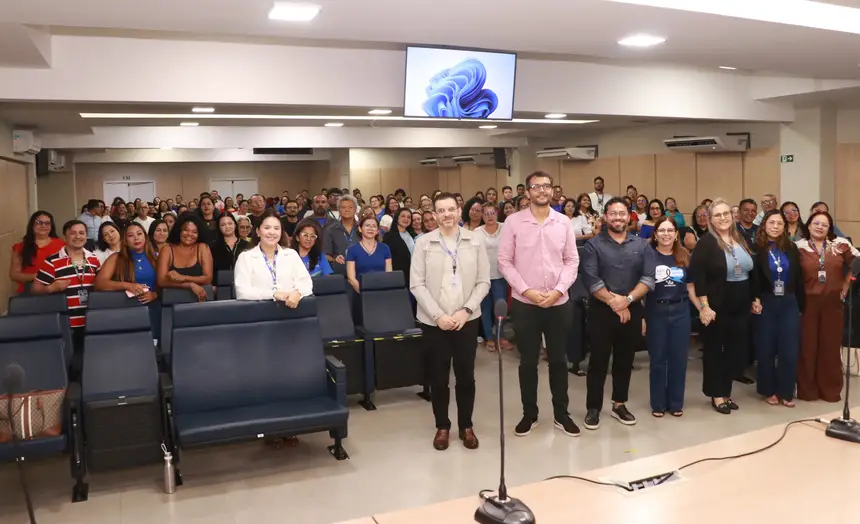
Guided by the National Policy for Comprehensive Men's Health Care (PNAISH), the annual campaign addresses men's health in a comprehensive manner, not limited to prostate cancer prevention and encouraging the adoption of healthy habits in diet, physical exercise, cessation of smoking, control of alcohol consumption, regular visits to health services, and use of condoms in sexual relations.
This year, Sespa emphasizes that studies often indicate that masculinity, linked to strength, invulnerability, and self-sufficiency, is directly related to the neglect of men's mental health, contributing to risk behaviors, high suicide rates, and low adherence to treatments.
To mark the beginning of the campaign, there was a seminar in the auditorium of Sespa to discuss themes associated with confronting gender-based violence, which often manifests in different contexts, from fights and robberies to cases of domestic violence and femicide, causing overload on health and justice systems.
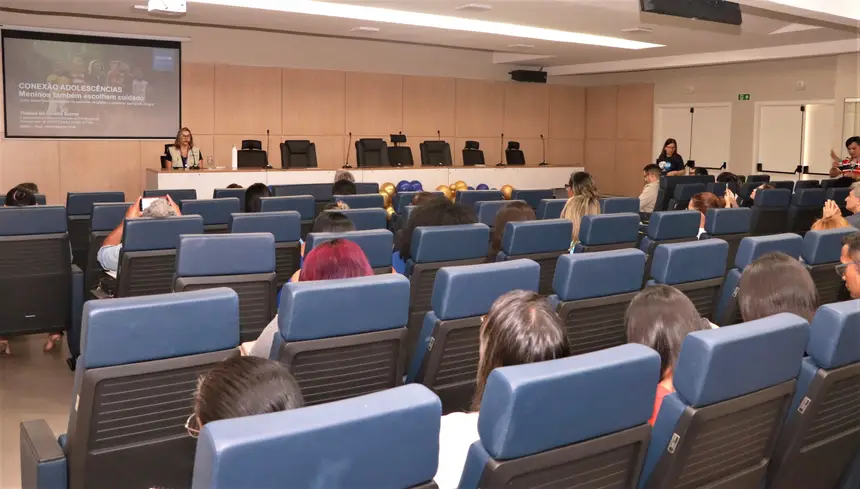
Theme - During the program, adjunct professor Eric Alvarenga from the Psychology course at the Federal University of Pará (UFPA) and coordinator of the Tramas Group (Work and Masculinities) discussed the theme "Masculinities and confronting gender-based violence." Following that, the theme "Transforming masculinity: from aggression to collaboration and the partner's prenatal care" was addressed by nurse Aline Gobbo, a specialist in Women's Health and municipal coordinator of Women's Health and Doula.
Specialist Thaíssa Scerne, a specialist in Adolescent Development and Participation at Unicef (United Nations Children's Fund), spoke about "Inspiring examples – Adolescence Connection Project." For the seminar, Sespa partnered with the technical reference for men's health from the Health Department of Belém (Sesma), represented by psychologist Maísa Gomes.
Risks - The state coordinator for Men's Health, Andrei Porpino, warned that the main cause of male mortality in Pará is associated with diseases of the circulatory system (myocardial infarction, stroke, and heart failure), which increasingly affect young people under 30 years old. "This is a reflection of unhealthy habits, such as sedentarism, smoking, excessive alcohol consumption, and industrialized food, and the lack of routine exams for the early detection of chronic and non-communicable diseases, such as hypertension and diabetes," he explained.
The second leading cause of deaths among men in Pará is of external origin, mainly interpersonal violence, traffic accidents, and suicide, as men commit more suicides by employing more brutal methods and avoiding professional help.
"Hence the importance of the theme chosen for the 2025 edition of Blue November, the importance of self-care and prevention of violence, especially against women and girls," emphasized Andrei Porpino, while presenting the panel on interpersonal and self-inflicted violence, promoted by the Ministry of Health, which in 2024 recorded, in Pará, 10,558 notifications, with 77% of the victims of violence being female.
Regarding age group, the number of occurrences tends to increase considerably as girls reach puberty, and only decreases after old age.
The main types of violence against women are physical (57%), psychological (22%), and sexual (18%). Among the types of sexual violence, there are rape (52%) and sexual harassment (35%). About 70% of cases occur at home, and more than 80% of aggressors are men, most of whom have a relationship with the victim: boyfriend (or ex-boyfriend), partner (or ex-partner), father, or stepfather.
Essential exams - In this sense, the Men's Health Coordination of Sespa maintains a solid partnership with the Metropolitan Polyclinic of Belém, which performs 18 routine exams considered essential for the prevention of numerous diseases, especially chronic non-communicable diseases, such as hypertension, diabetes, and kidney failure.
During the larger actions of the Territories for Peace Program (TerPaz), men can also count on vaccination services, rapid testing for Sexually Transmitted Infections (STIs) - such as HIV, hepatitis B and C, and syphilis - nutritional assessment and guidance, auriculotherapy, nursing triage, and medical consultations, in addition to filling out registration with the team from the Coordination of Persons with Disabilities (Ceped) to obtain prostheses, orthoses, wheelchairs, shower chairs, and free passes.
Throughout the month of November, professionals who make up the State Coordination of Men's Health of Sespa will be engaged in a series of activities, such as health and educational actions, in the agendas of TerPaz and the Peace Factories, as well as in hospitals and public squares.



